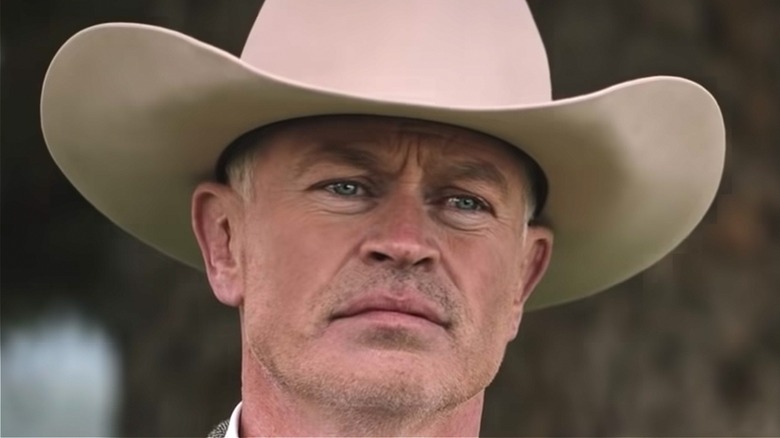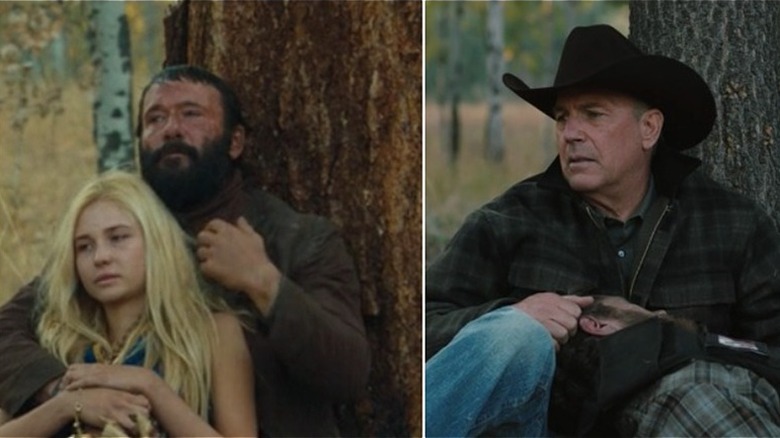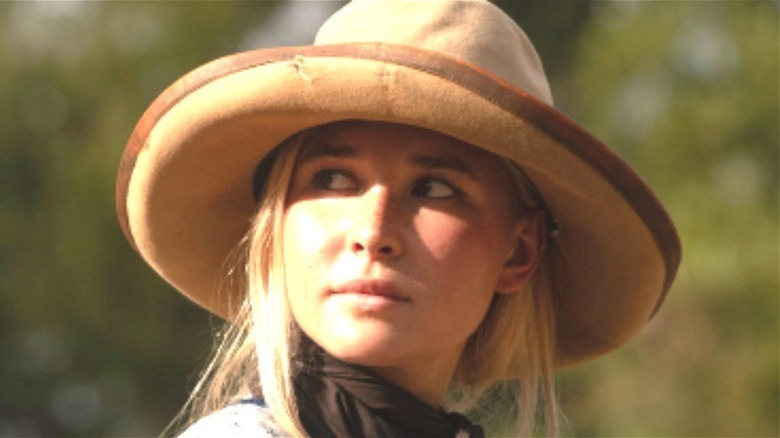The Yellowstone Reference Only Big Fans Noticed In The 1883 Season 1 Finale
Warning: Major spoilers for "1883" and "Yellowstone" ahead.
On February 27, Paramount+ treated viewers to an absolute pile of heartache and devastation with the tenth episode of "1883," "This Is Not Your Heaven." Though the episode feels very much like a season finale (if not a series finale, since two of the show's main characters die), the network has thus far declined to call its officially-ordered future episodes a "second season," leaving some to speculate that it's not, technically, a finale of either kind (via The Hollywood Reporter). Whichever way you slice it, the immediate narrative presented to viewers in the series' first 10 episodes came to a gut-wrenching conclusion on Sunday, with a scene that parallels an equally moving moment in Season 1 of its predecessor and in-world successor, "Yellowstone."
Despite audiences knowing from the series' very first scene that the formidable Elsa Dutton (Isabel May) was destined to be struck by an arrow, her slow demise and ultimate death as a result of her wound in Episode 10 still came as a shock. As Elsa slowly begins to shed her mortal coil, her father James (Tim McGraw) pulls her down from her horse, drags her over to a tree, and cradles his daughter in his lap as the two share a final exchange. Whether or not fans felt the scene a fitting end to Elsa's story, it was, as some have noted, a fitting scene with regard to the "1883" connection to "Yellowstone," and the prequel's eerily prescient echoing of the original show's recurring themes.
Yellowstone and 1883 share a heartbreaking goodbye between father and child
As fans of the original contemporary Western will recall, the "Yellowstone" pilot concluded with a similarly heartbreaking moment between Kevin Costner's John Dutton and his recently-deceased eldest son, Lee (Dave Annable). After lowering Lee's corpse off his horse, the Dutton patriarch drags his body over to a tree so he can share a final embrace with his son, rest awhile, and choose a spot for his burial. A small, loud bird interrupts their time together and serves as a kind of symbolism for the themes of the scene.
As user PiranhaKisses pointed out on the series' subreddit, John and his great-grandfather are "both sitting against a tree with their deceased children, both with a bird." Other fans were quick to note the similarity, with u/Heart_Spirited adding that both scenes involve a character saying they want to "rest for a bit." There are some differences (Lee has been dead for hours when John pulls him to the tree, whereas Elsa is in the process of dying), but for the most part, right down to the physicality of how both fathers carry and hold their children, the scenes are almost perfect replications of one another.
By ending the first 10 episodes of "1883," a prequel to the events that take place during "Yellowstone," on the same exact note upon which the latter essentially begins, the creators of the series have once again foregrounded — as they so often do in "Yellowstone" — the cyclical nature of life, death, and the struggle that lies in between.
Fans find deep meaning in Elsa's death
The death of a popular character is usually enough to send fans up in arms, but since Elsa's fate is telegraphed by design, "1883" viewers have had the chance to brace themselves for quite a while. When the inevitable end comes, and the viewer notices that the show has no intention of saving the character in some far-fetched fashion, many viewers have found that they actually liked the way the show handles her death — tragic as it is.
"I love how Elsa didn't just pass away and that was it," Twitter user @Charlotte_402 wrote. "We were able to see her happy and know that she was OK. Completely unexpected yet amazing writing. Death is so final and leaves you empty. They managed to not leave us, me anyway, with that."
User @rb7676 found the character and her fate both realistic and compelling. "Why am I so upset about Elsa in 1883?" they wrote. "I think I would mourn her death like she wasn't a fictional character!"
Another user tweeted a theory that Elsa's death might be the first in a long line of tragedies that Lee's deaths ties into, and that Yellowstone 1932 will also feature a chilling death in the family.
"John Dutton, in 'Yellowstone', says numerous times that he made a Promise to never sell the ranch," they wrote. "Im sure that when 1932 airs about John Duttons Father and Grand Father we see this "promise" made from one generation to the next, and it all starts with Elsa Dutton's death in 1883."
Could it be that the Duttons have paid the price of their ranch in blood? It's a chilling idea, and it will indeed be interesting to see whether the upcoming "1932" addresses it.


